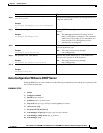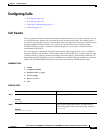
4-6
Cisco VG202, Cisco VG202XM, Cisco VG204, and Cisco VG204XM Voice Gateways Software Configuration Guide
OL-16191-01
Chapter 4 Configuring Voice
Auto-Configuration on the Cisco VG202, Cisco VG202XM, Cisco VG204, and Cisco VG204XM Voice Gateways
11. exit
DETAILED STEPS
Command or Action Purpose
Step 1
enable
Example:
VG# enable
Enters privileged EXEC mode.
Step 2
configure terminal
Example:
VG# configure terminal
Enters global configuration mode. You have entered
global configuration mode when the prompt changes to
VG(config)#.
Step 3
interface type slot/port
Example:
VG(config)# interface fastethernet 0/0
Enters interface configuration mode and specifies the
type of interface you plan to configure. You have entered
interface configuration mode when the prompt changes
to
VG(config-if)#.
Step 4
ip address dhcp
Example:
VG(config-if)# ip address dhcp
Acquires an IP address on an interface from the DHCP.
Step 5
sccp local interface-type interface-number port
port-type
Example:
VG(config)# sccp local fastethernet 0/0
Enables the SCCP and its related applications
(transcoding and conferencing).
Step 6
voice service voip
Example:
VG(config)# voice service voip
Enters voice-service configuration mode and specifies a
voice-encapsulation type.
Step 7
fax protocol t38 [nse[force]]
Example:
VG(config)# fax protocol t38 nse force
Specifies the global default ITU-T T.38 standard fax
protocol to be used for all VoIP dial peers.
Step 8
ccm-manager sccp local interface-type
interface-number
Example:
VG(config)# ccm-manager sccp local fastethernet
0/0
Selects the local interface that the SCCP application uses
to register with CUCM.
Step 9
ccm-manager config server tftp_ip_address
Example:
VG(config)# ccm-manager config server tftp
9.13.38.245
Specifies the TFTP server from which the voice gateway
downloads CUCM XML configuration files and enables
the system to download the port number of the
configuration port.


















